Exotic pets can range from a small turtle to a large cat. They are usually wild animals found in other parts of the world and are not domesticated.
Caring for exotic animals is difficult. Some live for many years, need large enclosures, and have very specific diets. An exotic pet must also be legal in your state, but you may need certain permits.
Despite all of this, exotic pets are becoming more and more popular due to their unique appearances.
If you think an exotic pet is for you, continue reading below to see which are legal in your state.
Best Exotic Pets
18. Serval
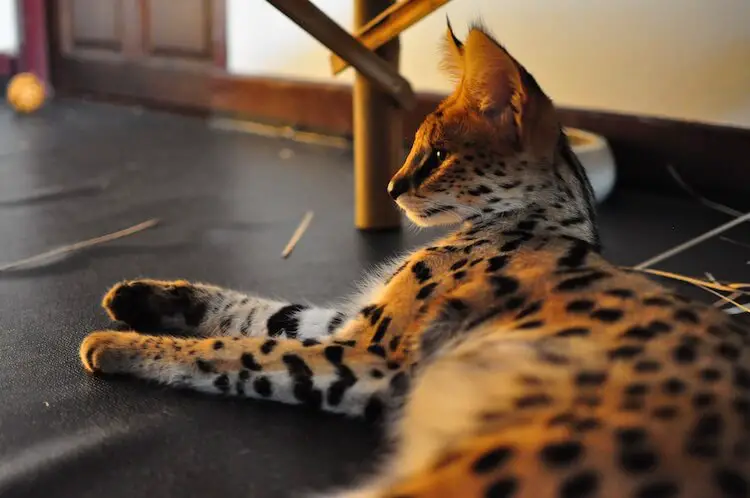
Servals are members of the feline family and are found throughout southern Africa.
These small wild cats have a slender and agile body covered in dark brown spots and stripes. Despite making an adorable pet, their appearance is not a good reason to keep one.
This exotic pet is not for an inexperienced cat owner. A domestic house cat normally makes a better pet.
Servals are shy and nocturnal animals. They need an owner that has the room and dedication to properly care for them. This includes having a large, fenced-in area and a swimming pool. The fence will need a top and must go several feet into the ground as servals love to dig and climb.
They should live outside, but they can be brought into a house if there is nothing in the room that will be prone to breaking.
Servals can make great pets. They are incredibly playful cats, who can warm up to their owners. They are normally tame if they are raised and bottle-fed by their owner.
| Keeping A Serval | |
|---|---|
| Legal States | Mississippi, Missouri, Montana, Tennessee, Texas, Nevada, Idaho, Wisconsin, Alabama, North and South Carolina, West Virginia, North and South Dakota, Oklahoma, Arizona, Indiana, Pennsylvania and Maine. |
| Illegal States | Ohio and Hawaii. |
| Price | $1,500 to $3,000 |
17. Fennec Fox
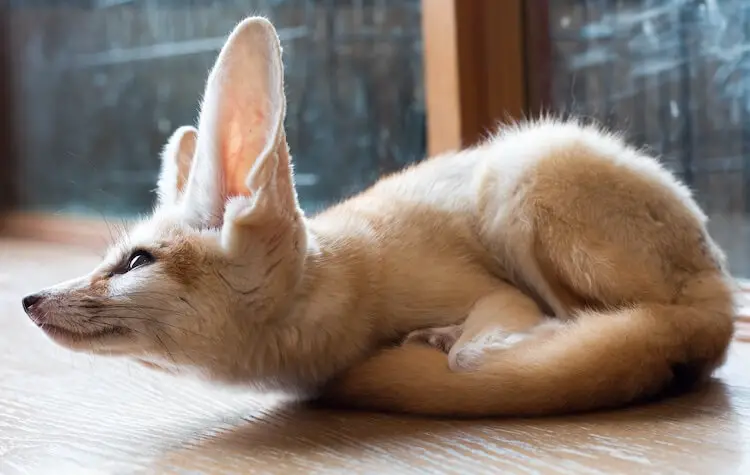
Fennec Foxes are mostly found in the Sahara Desert. They are very happy living in sandy, dry, desert-like environments. They are not for everyone, especially those living in Hawaii!
This fox is similar to a small playful dog, but they are still wild animals and will have wild instincts. They have both dog and cat-like qualities
Many people love their small size and adorably oversized ears.
Despite their cute looks, they tend to be independent and not very cuddly.
Like Servals, Fennec Foxes are shy and nocturnal. They are not for beginners and it is not always easy to care for them.
Fennec Foxes need large outdoor enclosures and plenty of space to exercise. With correct care, they can live up to 14 years, but they need a high level of dedication to give them a happy and healthy life.
| Keeping A Fennec Fox | |
|---|---|
| Legal States | Alabama, Alaska, Arizona, Arkansas, California, Colorado, Connecticut, Delaware, Florida, Georgia, Idaho, Illinois, Indiana, Iowa, Kansas, Kentucky, Louisiana, Maine, Maryland, Massachusetts, Michigan, Mississippi, Montana, Nebraska, New Hampshire, New Jersey, New Mexico, New York, North Carolina, North Dakota, Ohio, Oklahoma, Oregon, Pennsylvania, Rhode Island, South Carolina, South Dakota, Tennessee, Texas, Utah, Vermont, Virginia, West Virginia, Wisconsin, Wyoming. |
| Illegal States | Hawaii, Missouri, Minnesota, Nevada and Washington. |
| Price | $2,000 to $3,500 |
16. Hyacinth Macaw
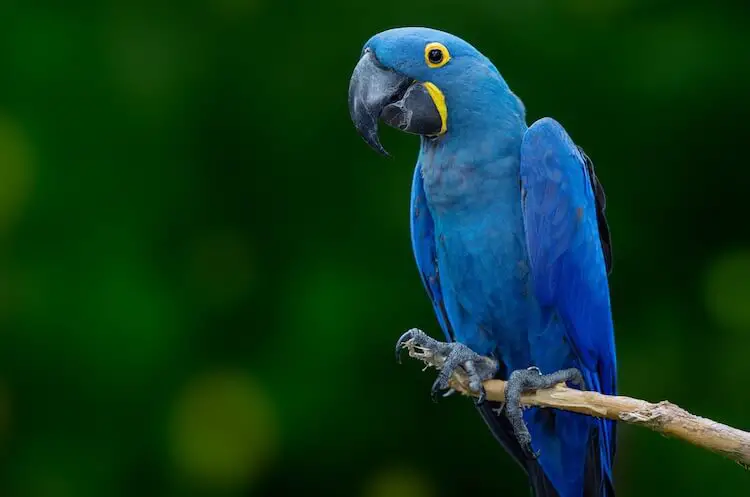
Hyacinth Macaws are beautiful wild parrots that are famous for their bright blue feathers. They generally have black beaks and yellow face markings too.
These birds are from South America and live in tropical forests, mostly near the Amazon River. It is illegal to export Hyacinth Macaws from South America, but their population is still declining due to illegal exportation and habitat destruction. Due to this, Hyacinth Macaws are classified as an endangered species. They should only be purchased from captive breeders.
This bird is a beautiful exotic pet, but it should not be owned by just anyone.
Hyacinth Macaws need an owner with lots of experience in exotic bird husbandry that wants to help preserve the species.
They are friendly, gentle and easily trainable birds. They tend to form a strong bond with their handler for up to 50 years.
Macaws do need a large space. Most, if not all, commercial cages are too small for this parrot. Leaving your bird in its cage to sit all day is not a good life. Ideally, this bird should be kept in a large aviary. They are very intelligent, so they need lots of space and lots of things to do.
| Keeping A Hyacinth Macaw | |
|---|---|
| Legal States | Alaska. |
| Price | $500 to $10,000 |
15. Porcupine
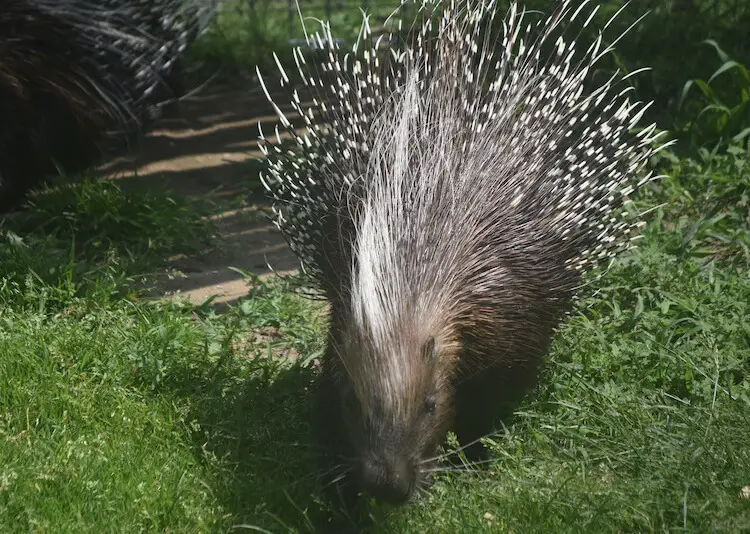
Porcupines are rodents found throughout most of the United States. In many places they are considered to be pests, but, they can be kept as exotic pets too.
It is best not to try and keep a wild porcupine. Like many exotics, they are not especially affectionate and can be territorial, so they will try to defend themselves.
Porcupines tend to be dark brown to black with quills that are white in color.
When they do not feel threatened their quills will be flat and you can stroke their back.
This animal needs someone who has previously cared for unusual animals. Their keeper must be able to read animal body language too.
They are better suited to someone who has experience caring for a variety of pets such as rodents and other wild animals found in the United States.
| Keeping A Porcupine | |
|---|---|
| Legal States | Kansas, Minnesota, New York and Wisconsin. |
| Price | $800 to $1,000 |
14. Egyptian Tortoise
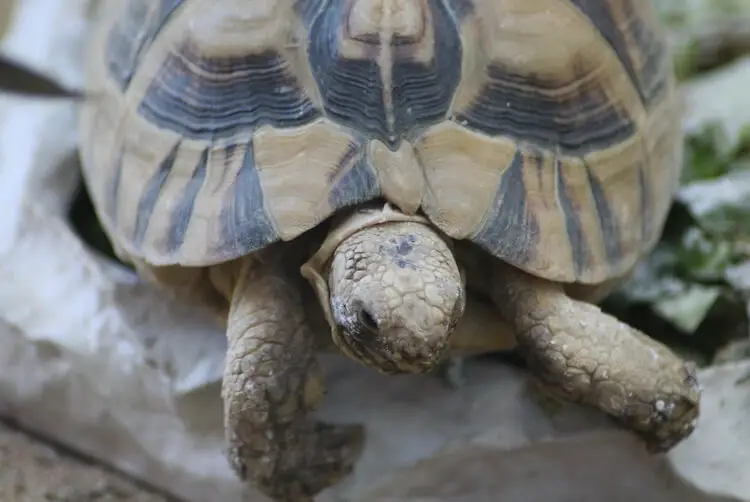
The Egyptian Tortoise is a rare type of tortoise.
Compared to many of the exotic animals on this list, they make great pets, especially for those who have done their research and are ready to dedicate their time.
These cute pet tortoises grow to about six inches in length and are generally golden-brown in color with dark brown shell markings. These tortoises do not enjoy being handled, but they are still friendly and like to explore.
What makes tortoises difficult to care for is that they require consistent care to keep them healthy.
They can quickly become sick with an owner that is unsure of how to care for them.
With the right care Egyptian Tortoises can live to 100 years old.
They require an owner who is willing to dedicate their whole life to their pet. They are best suited to an owner that has cared for pet reptiles before.
| Keeping An Egyptian Tortoise | |
|---|---|
| Legal States | Every State – if purchased through a US breeder. |
| Price | $500 to $1,500 |
13. Capybara
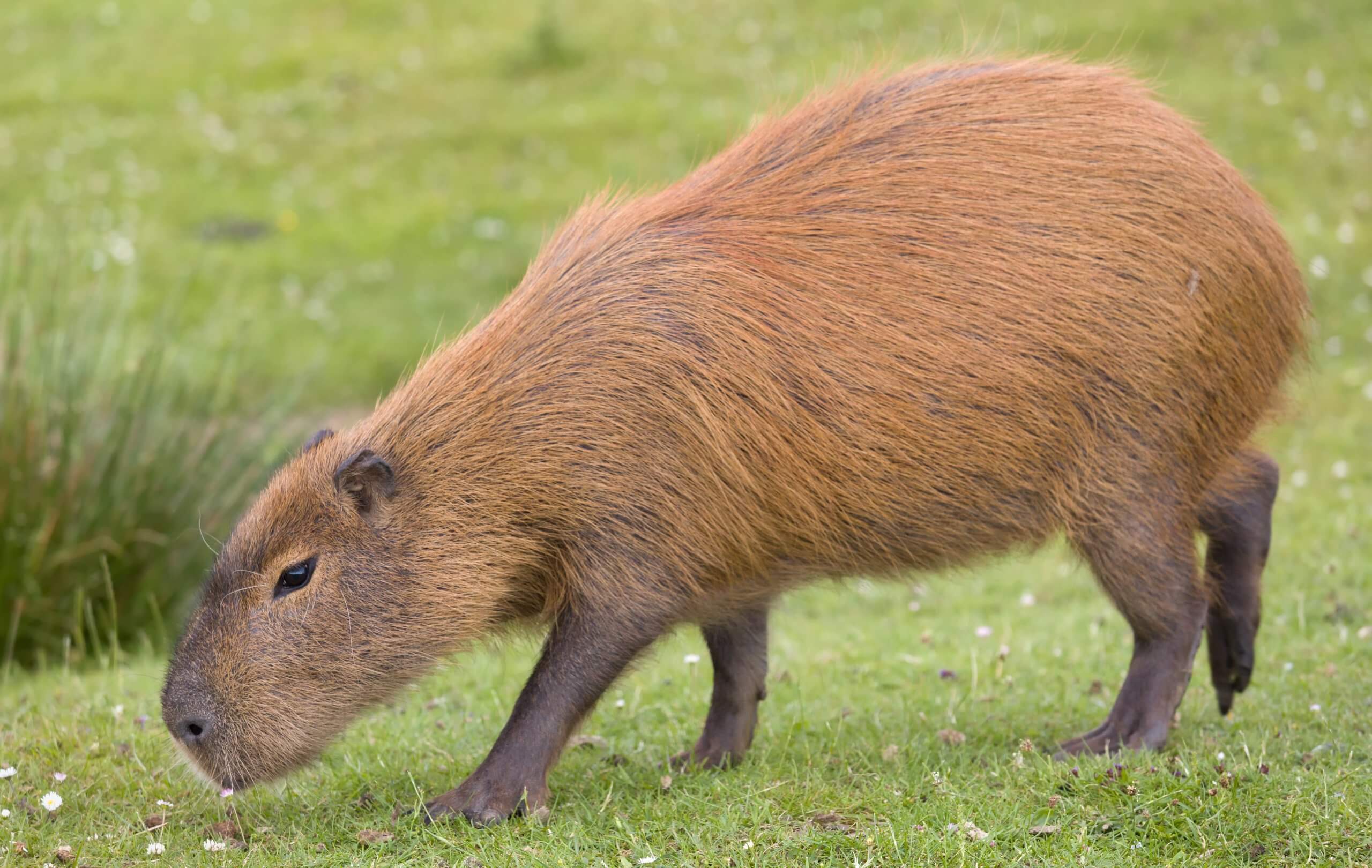
Capybaras are the largest rodent in the world, they can stand over three feet tall and weigh up to 150 pounds!
These animals look like giant guinea pigs because they are closely related each other. They are usually brown in color and have prominent front teeth. They use their teeth to eat a diet of timothy hay. This makes a capybara very easy to feed!
Capybaras are friendly and sociable animals. They easily make friends with other pets.
Though capybaras are very pleasant pets to have around, they are much more work than any other rodent.
Firstly, it is best for their health if they have companionship. These companions should be other capybaras. Capybaras are group animals, and those that live alone do not live happy lives.
Secondly, due to their size, capybaras also need plenty of space. As well as a small backyard, they are semi-aquatic animals and need a pond or large pool to swim in.
Despite their work, Capybaras are entertaining and fun pets.
| Keeping A Capybara | |
|---|---|
| Legal States | Florida, New York, Texas and Pennsylvania. |
| Illegal States | California and Georgia. |
| Price | $1,000 to $3,000 |
12. Mississippi Map Turtle
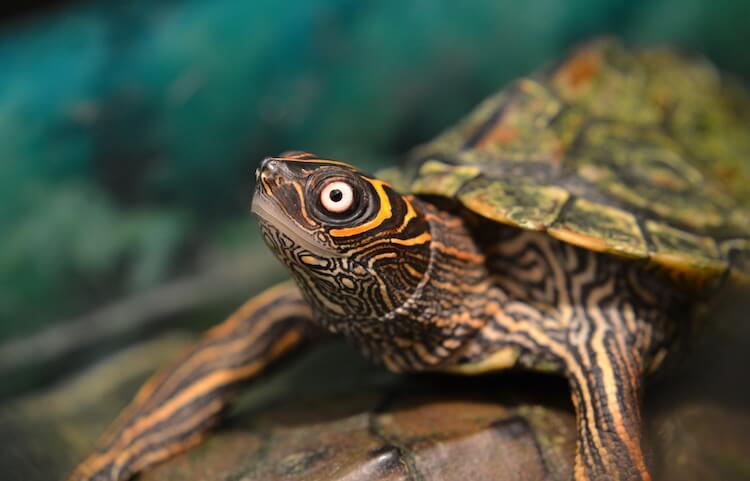
The Mississippi Map Turtle is a brown turtle with pale yellow-white “contour” lines on its skin.
As their name implies they are commonly found in Mississippi. They are also found in Texas, Louisiana, and Arkansas as well as along the Missouri, Mississippi, and Ohio Rivers.
Map Turtles are also named after the patterns on their body. These patterned lines resemble contour lines on an elevation map.
Mississippi Map Turtles are more skittish than many other pet turtles, but they are unique. They make great pets for those looking to care for a reptile that is more for display.
Other popular map turtle species include: Common, False, Yellow-Blotched, and Ringed.
| Keeping A Mississippi Map Turtle | |
|---|---|
| Legal States | Every State. |
| Price | $25 to $100 |
11. Llama
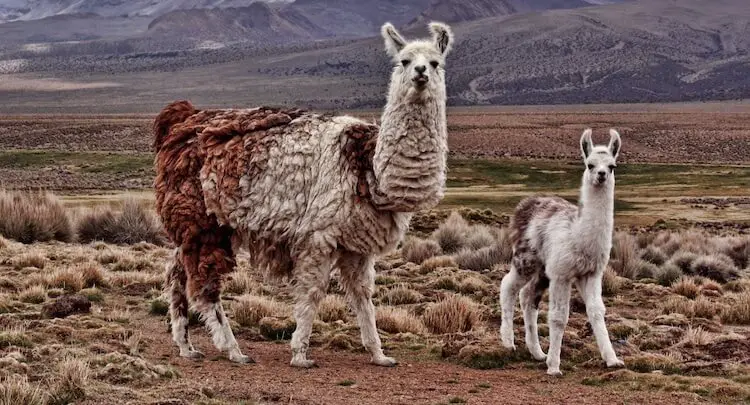
Llamas are domesticated animals from the same family as camels. These animals are closely related to sheep, goats, and alpacas. They have long necks, protruding lower front teeth, and can stand about six feet tall.
It is common for Llamas to be kept in packs along the Andes Mountains in South America. However, Llamas are also kept as pets throughout North America, Europe, and Australia.
You shouldn’t adopt a Llama if you live in a city or town as they will not have enough space to be happy. They should have access to shelter and this area should be heated if it gets cold in the winter. They also need to be groomed regularly.
Llamas are social, friendly and easy to train from a young age.
They are best suited to someone who has owned livestock or backyard goats or sheep.
| Keeping A Llama | |
|---|---|
| Legal States | Alaska, California, Colorado, Idaho, Kentucky, Massachusetts, Michigan, Michigan, Minnesota, Mississippi, Nebraska, New Hampshire, New Jersey, New Mexico, Ohio, Oregon, Tennessee, Vermont, Virginia, Washington, Wisconsin and Wyoming. |
| Price | $1,000 to $5,000 |
10. Red-Eyed Crocodile Skink
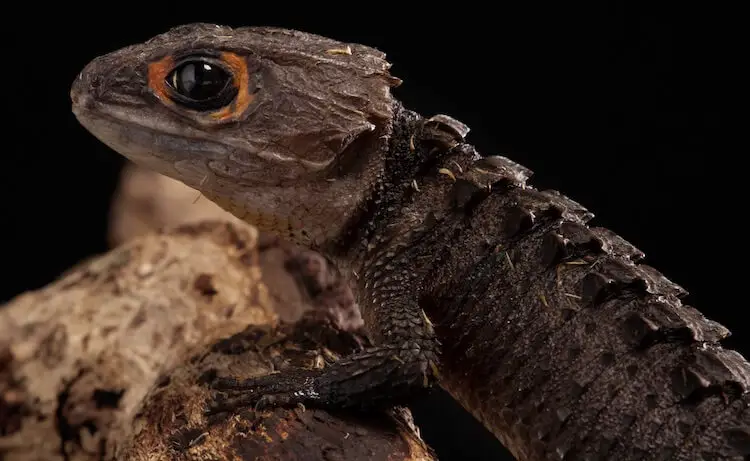
Red-Eyed Crocodile Skink are a type of skink named after their crocodile-like appearance and red ring around their eyes. Luckily, they are much tamer and smaller than pet crocodiles. But, they can still make someone feel like they have their own tiny croc!
They are becoming increasingly popular pets for experienced herpetologists.
Red-Eyed Crocodile Skinks are small lizards and do not need a lot of space. What sets them apart from other skinks is how well they thrive in captivity in social groups and their unique appearance.
| Keeping A Red-Eyed Crocodile Skink | |
|---|---|
| Legal States | Every State. |
| Price | $175 to $300 |
9. Chinchilla
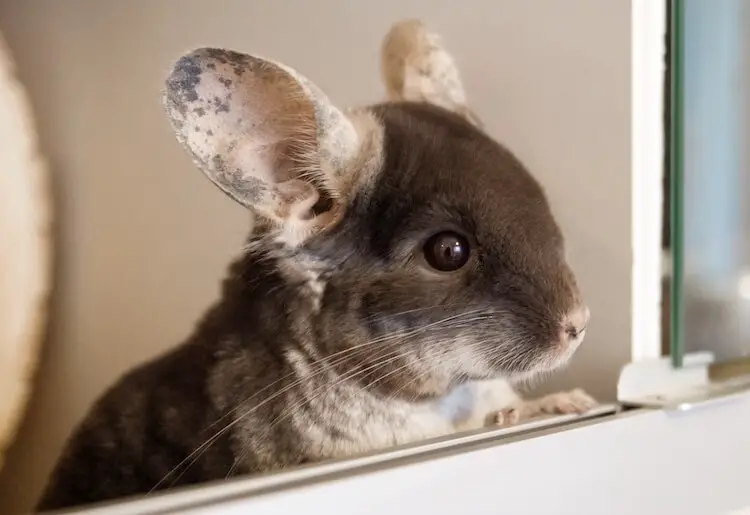
Chinchillas are small rodents that look like a mouse! They have long whiskers, large ears, thick fur, and bushy tails.
It is only possible to find wild Chinchillas in the mountains of northern Chile. But, they are commonly captive-bred for the pet trade. They are normally purchased by someone looking for a small and unique pet rodent.
Despite, looking like a mouse they are very similar in care to guinea pigs.
Chinchilla husbandry is similar to many domestic rodents:
- As they are used to living in dry environments they need regular dust baths. Their skin will become too oily without dust baths.
- They need a large area for plenty of exercise.
- They should have a partner chinchilla to socialize with. It is also possible to keep them in groups as they are highly social animals.
- Their tank should be in a part of the house that is cool and quiet during the day.
With handing from a young age, they can become very attached to their owners and be very playful. While they are not for everyone, Chinchillas can make great pets for someone who loves rodents
| Keeping A Chinchilla | |
|---|---|
| Legal States | California, Delaware, Florida, Hawaii, Kentucky, Maine, Massachusetts, Missouri, Nebraska, New Hampshire, South Dakota, Oregon, Rhode Island, Tennessee, Utah, Vermont, Virginia, Wisconsin and Wyoming (with a permit). |
| Price | $150 to $300 |
8. Red-Footed Tortoise
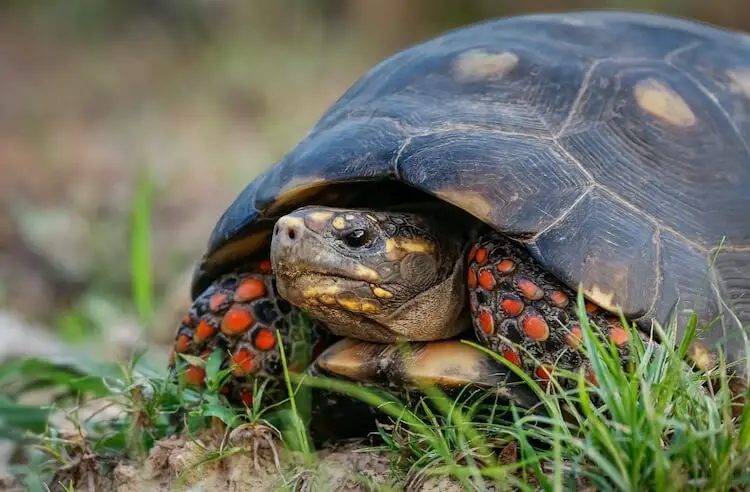
The Red-Footed Tortoise is the second exotic tortoise on our list.
Red-Foots are more popular than the previously mentioned Egyptian Tortoises because they thrive better in captivity. They are also more readily available and are not endangered in the wild.
Red-Footed Tortoises are found mostly found in the savannas and forests of Panama, Paraguay and Brazil.
The Red-Footed Tortoise is a colorful pet reptile. They are normally dark brown in color with bright golden shell patches and red and orange coloring on their legs and head.
Like most tortoises, they do need a lot of space to walk and exercise. They are active tortoises and like walking throughout the day. Most tortoise enclosures are about ten feet in width and length. They also need warm temperatures and lots of light.
If their enclosure is set up properly the Red-Footed Tortoise is a low maintenance pet that can live for up to 50 years in captivity.
Beginners who have cared for other reptiles can quite easily care for these tortoises.
| Keeping A Red-Footed Tortoise | |
|---|---|
| Legal States | Every State. |
| Price | $200 to $500 |
7. Milk Snake
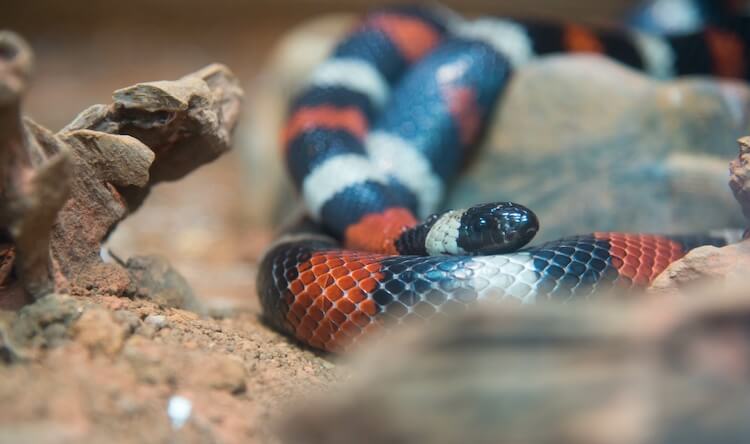
Milk Snakes are great beginner pet snakes because they are relatively docile and easy to take care of. Very quickly they become accustomed to gentle handling.
These American snakes have a very wide native range and can be found as far north as Canada and as far south as Venezuela!
They also have varying color patterns. Milk Snakes are usually red with yellow bands, and thick black bands separate the red from the yellow. Their appearance makes them look like an exotic snake, but unfortunately they are also confused with the more dangerous coral snake.
Milk Snakes should live in a secured tank with space for lots of exercise and a source of light and heat.
Overall, Milk Snakes are generally an easy-to-care-for species and will live for 10 to 20 years with proper husbandry.
| Keeping A Milk Snake | |
|---|---|
| Legal States | Every State. |
| Price | $125 to $500 |
6. Yellow-Bellied Slider
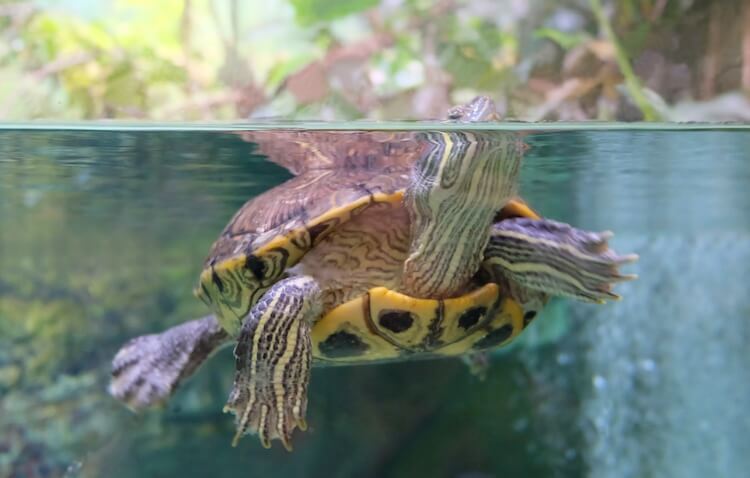
The Yellow-Bellied Slider is one of the most popular turtles in the United States.
Yellow-Bellied Sliders are not exactly exotic pets, as they are found in the wild in Florida and many other states. But, they make an interesting and unique pet. Red-Eared Sliders are closely related and also make great pets.
Yellow Sliders are dark brown or gray on their heads and their underbelly and legs are bright yellow with stripes.
Unlike tortoises, turtles are semi-aquatic.
These Sliders are active during the day and will spend most of their time swimming or basking. They do not like be handled, but they are very fun to watch.
Most turtle owners buy large turtle aquariums to house this species (pictured above). Like most reptiles, turtles also need UVB light and heat source.
Yellow-Bellied Sliders are one of the best turtles for a beginner to own. When taken care of properly they can live for up to 40 years.
| Keeping A Yellow-Bellied Slider | |
|---|---|
| Legal States | Every State. |
| Price | $25 to $100 |
5. Hedgehog
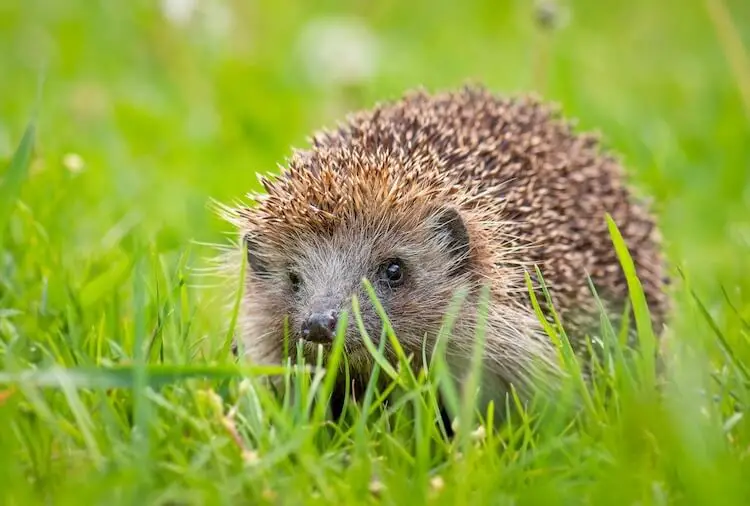
Hedgehogs are found in the wild in Europe, Asia, Africa and New Zealand.
They are unique for their button nose and spiky quills that line their back. They are more cuddly than many other exotic pets and can be cared for by beginners, but you should watch out for their quills! It may take a while to get used to handling them safely.
The Hedgehog is a cute and unique animal that is relatively easy to care for.
Hedgehogs can be housed like guinea pigs or hamsters in rodent cages. They like to eat vegetables, fruits, and even sometimes various dog or cat foods.
Overall they are great pets for any level and can live for seven years.
| Keeping A Hedgehog | |
|---|---|
| Legal States | Delaware, Florida, Maryland, Montana, South Dakota, Utah and Arizona. |
| Illegal States | Colorado, Hawaii, California, Georgia and Maine. |
| Price | $100 to $300 |
4. Ball Python
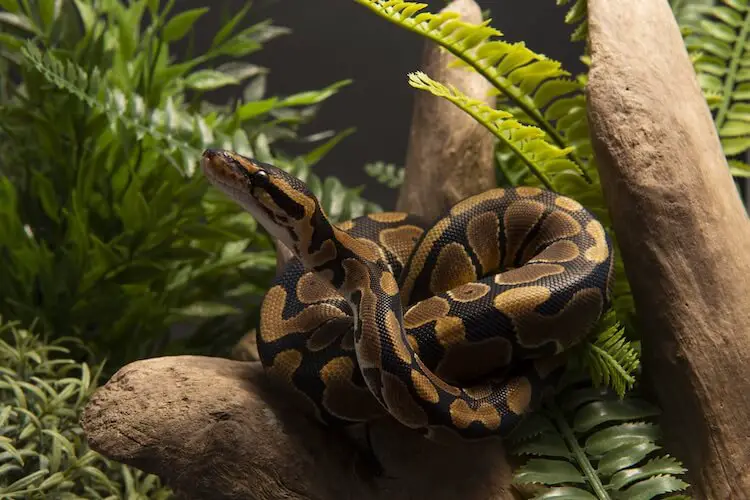
Ball Pythons are one of the most popular pet snakes in the United States. These snakes are very docile and great for beginners.
Originally from Africa, they come in a variety of different colors and patterns. The wild type comes in different shades and patterns of brown and can also grow to six feet in length.
Ball Pythons receive their name from the little “ball” they curl into when they are resting or when they feel threatened. Regular handling will help your Ball Python be more outgoing.
Pythons can be fussy eaters, so they may require an owner that is more patient. They like to eat mice and small rats, so they suit owners who are comfortable feeding other animals to their pet.
Overall, they are docile, friendly snakes. Any dedicated beginner would be lucky to have this pet.
| Keeping A Ball Python | |
|---|---|
| Legal States | Most states (with a permit). |
| Illegal States | Florida, New York City and Hawaii. |
| Price | $1,500 to $3,000 |
3. Tarantula
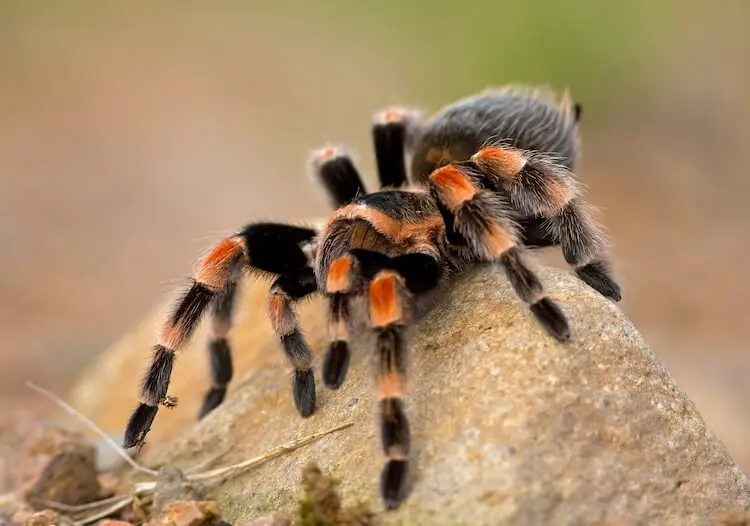
They may look scary, but Tarantulas are actually tame and docile spiders.
If you want a low-maintenance exotic animal, and do not have arachnophobia (fear of spiders), this may be the pet for you!
There are over 900 species of Tarantula found in South America and the southwestern United States.
Many of these pet spiders come in different sizes and colors. Their care will vary depending on which species you choose.
Tarantulas are great pets, but not for handling. Even though they are usually docile, they do have a venomous bite. For this reason, they need a secure enclosure!
| Keeping A Tarantula | |
|---|---|
| Legal States | Alabama, Alaska, Arizona, Arkansas, California, Colorado, Connecticut, Delaware, Georgia, Idaho, Illinois, Indiana, Iowa, Kansas, Kentucky, Louisiana, Maine, Maryland, Massachusetts, Michigan, Minnesota, Mississippi, Missouri, Montana, Nebraska, Nevada, New Hampshire, New Jersey, New Mexico, New York, North Carolina, North Dakota, Ohio, Oklahoma, Oregon, Pennsylvania, Rhode Island, South Carolina, South Dakota, Tennessee, Texas, Utah, Vermont, Virginia, West Virginia, Washington, Wisconsin, Wyoming. |
| Illegal States | Florida and Hawaii. |
| Price | $25 to $100 |
2. Leopard Gecko
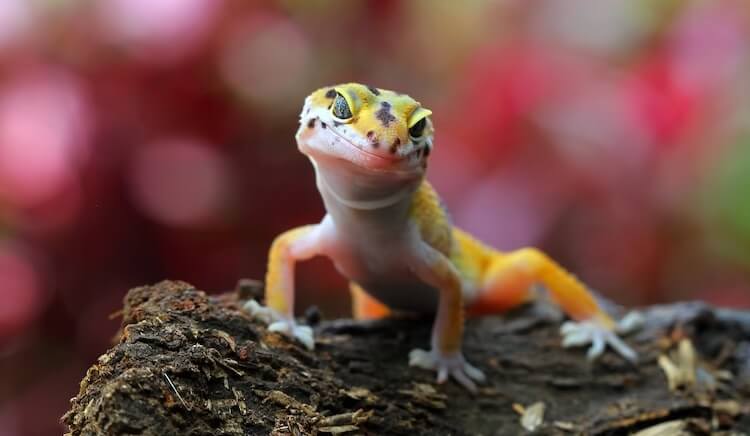
Leopard Geckos are small lizards that make great pets. They are very popular due to their handleability and ease of care.
They are just ten inches long and come with beautiful tan bodies and brown Leopard spots.
This type of gecko is native to the deserts of the Middle East. It is now illegal to export them from their habitat, but they are one of the most captive-bred reptiles in the world.
Leopard Geckos do need a certain level of care, but it is a routine that any beginner can learn. Your Leopard Gecko should also have lots of heat and light, as well as a proper diet. They eat a variety of insects and need vitamin and mineral supplements.
Overall, Leopard Geckos are very easy to care for. Many can live up to 20 years with the correct husbandry and an owner interested in learning how to care for them.
| Keeping A Leopard Gecko | |
|---|---|
| Legal States | Alabama, Alaska, Arizona, Arkansas, California, Colorado, Connecticut, Delaware, Florida, Georgia, Idaho, Illinois, Indiana, Iowa, Kansas, Kentucky, Louisiana, Maine, Maryland, Massachusetts, Michigan, Minnesota, Mississippi, Missouri, Montana, Nebraska, Nevada, New Hampshire, New Jersey, New Mexico, New York, North Carolina, North Dakota, Ohio, Oklahoma, Oregon, Pennsylvania, Rhode Island, South Carolina, South Dakota, Tennessee, Texas, Utah, Vermont, Virginia, West Virginia, Washington, Wisconsin, Wyoming. |
| Illegal States | Hawaii. |
| Price | $50 |
1. Bearded Dragon
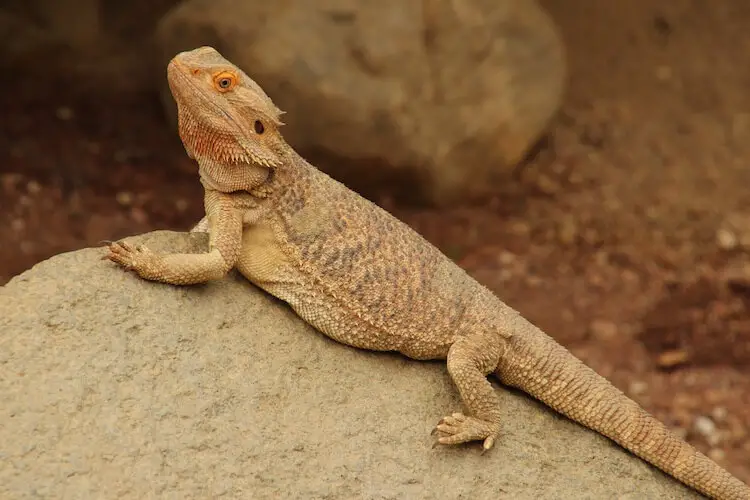
Bearded Dragons are the most popular pet lizard and the best exotic pet! They are fun for beginners and experts alike.
These exotic Australian animals are sociable, docile, and very friendly lizards. They tolerate handling very well, and some even like to perch on their owners’ shoulders.
Bearded Dragons typically grow one to two feet in length and are yellow to tan in color.
Affectionately known as Beardies, these reptiles can live for 10 to 15 years and are very easy to care for.
Bearded Dragons must live in an appropriately sized tank with lots of branches and rocks to climb on and hide under! Their tank should be cleaned about once a week. They thrive with an owner that has an interest in caring for reptiles and has done their research.
| Keeping A Bearded Dragon | |
|---|---|
| Legal States | Alabama, Alaska, Arizona, Arkansas, California, Colorado, Connecticut, Delaware, Florida, Georgia, Idaho, Illinois, Indiana, Iowa, Kansas, Kentucky, Louisiana, Maine, Maryland, Massachusetts, Michigan, Minnesota, Mississippi, Missouri, Montana, Nebraska, Nevada, New Hampshire, New Jersey, New Mexico, New York, North Carolina, North Dakota, Ohio, Oklahoma, Oregon, Pennsylvania, Rhode Island, South Carolina, South Dakota, Tennessee, Texas, Utah, Vermont, Virginia, West Virginia, Washington, Wisconsin, Wyoming. |
| Illegal States | Hawaii. |
| Price | $50 to $100 |
Choosing The Right Exotic Pet
There are many things to consider when choosing a rare pet.
Here are some things to keep in mind when making your decision.
Is the pet you want legal to keep in your state or city, or do you need a license?
Licenses and permits vary from state to state, and even between cities and counties. Specific animals may also be legal without a permit, while others are not. Remember that just because a pet is legal to keep, it does not mean that you are equipped to care for one.
Do you have enough experience and space to keep one?
Most turtles, tortoises, and birds can live for over 50 years. They are a long-term commitment. Some animals require a level of expertise that only comes with having years of experience.
The pet trade is full of abandoned animals with previous owners that did not understand how to care for them.
If you are confident that you can properly care for one of the pets, then speak with a trusted breeder. They will have plenty of experience and knowledge about the animal that they are selling and can advise on your suitability as a keeper.
Exotic animals can make great pets for the right people. Do you have a favorite? Tell us in the comments below!


I have a chinchilla (for the record, some of the info you give is not quite correct, let me know if you want some more up-to-date information). I absolutely adore her….but she’s definitely a high-maintenance pet that I wouldn’t recommend for everyone. For the right person, chinchillas can be adorable, inquisitive, affectionate companions, but you have to be willing to put in the research, time, and money to care for them properly. They’re delicate creatures with very specific care requirements, and they don’t give their trust to humans freely, so you have to have the patience to bond with them slowly over time. That said, they can be very rewarding pets, and they’re cute beyond all reason.
I also recently adopted a beautiful Kenyan Sand Boa (wild-type adult). Compared to the chinchilla, she’s very easy to care for! She’s such a gorgeous, sweet snake. Sand boas are small and don’t require huge enclosures or high humidity. I think they’re a great species for anyone who wants a small, docile, adorable snake that is relatively low-maintenance.